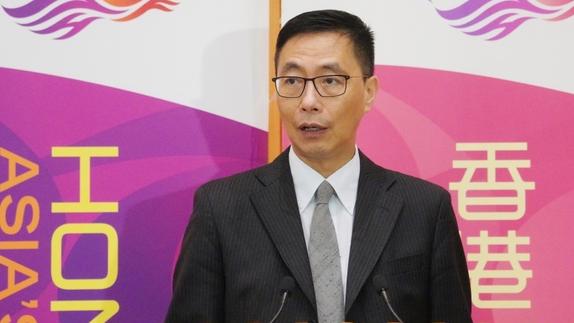 Secretary for Education Kevin Yeung Yun-hung announce on Thursday that all kindergartens, primary and secondary schools in Hong Kong will remain closed until March 16. (PHOTO PROVIDED TO CHINA DAILY)
Secretary for Education Kevin Yeung Yun-hung announce on Thursday that all kindergartens, primary and secondary schools in Hong Kong will remain closed until March 16. (PHOTO PROVIDED TO CHINA DAILY)
Cross-boundary pupils attending Hong Kong schools were left uncertain about how this semester will come about, after the government extended class suspensions on Thursday, following a policy to place all travelers from the mainland under quarantine for 14 days in its bid to contain the spread of the novel coronavirus.
Parents said the unexpected month-long school break had disrupted their children’s studies; they are hoping for an exemption from the two-week quarantine after classes resume.
Even if my son is allowed entry to the school later in this semester, I am afraid he will be discriminated against by some of his local classmates. I would prefer that he did online learning
Tina Zhang, mother of an 8-year-old boy studying at a school in Hong Kong
All kindergartens, primary and secondary schools in Hong Kong will remain closed until March 16, Secretary for Education Kevin Yeung Yun-hung told a media briefing on Thursday. He cited risks of cluster infections which have already appeared in the city.
ALSO READ: HK landlords start to slash retail rents as virus bites
Primary Six pupils’ last exam for secondary school placements has been canceled, so spot allocations will be based on students’ scores in the first two exams, explained Yeung.
The Education Bureau is also considering postponing, by about one month, parts of the Diploma of Secondary Education test - Hong Kong’s college entrance exam.
“The cancellation has really caught us off guard. I was expecting my son to get better scores in the last exam so that he might get into a higher-band middle school,” said Alice Lee, mother of a Primary Six boy.
Lee, who lives with her family in Shenzhen, is one of those parents of nearly 30,000 pupils who spend hours each day crossing the boundary to attend Hong Kong schools.
Yeung said the bureau would take into account the interests of cross-boundary students in terms of quarantine rules. But it will also assess the impact of having students coming over from Shenzhen where the coronavirus has infected about 400.
Yeung also suggested schools turn to online teaching to ensure “learning is not suspended” during class suspensions. This comes as a further extension of the stay by cross-boundary students in Shenzhen is possible if the epidemic is still not under control by mid March.
However, Lee said her 11-year-old son can hardly concentrate on his online courses for more than 20 minutes due to a lack of interactivity and monitoring. He even played computer games for a whole day when his parents were at work.
Teddy Tang Chun-keung, chairman of the Hong Kong Association of the Heads of Secondary Schools, told local media the authorities might consider moving cross-boundary pupils to Shenzhen schools for the time being. They might also set up temporary classes specially tailored for these children in Shenzhen.
Another factor concerning these parents is school bullying — arising from prejudice against people with the Chinese mainland background amid the virus outbreak. Many Chinese people overseas were reportedly verbally abused by locals.
Tina Zhang, mother of an 8-year-old boy studying at a school in north Hong Kong, said: “Even if my son is allowed entry to the school later in this semester, I am afraid he will be discriminated against by some of his local classmates. I would prefer that he did online learning.”
She said fears of bullying directed at her son linger on during a “horrible” school year - rocked by anti-government protests and now the coronavirus outbreak.
READ MORE: City battles the novel coronavirus
Hong Kong reported three new cases of infection on Thursday, bringing the tally to 53. On the mainland, the total number of confirmed cases rose to over 59,000, mainly due to a change in diagnostic criteria, with over 1,300 fatalities.
The massive infection has led to most mainland schools further extending closures and switching to e-learning. In a trending topic on Weibo, the Chinese equivalent of Twitter, tens of thousands of students said they are required to follow their physical education teacher’s instructions via live-streamed video, and then upload their exercise records to the school.


